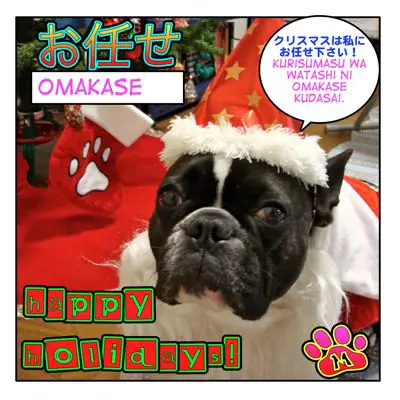「クリスマスは私にお任せ下さい!」
= Kurisumasu wa watashi ni omakase kudasai.
= You can count on me for Christmas!
Ho ho ho!!! Hi everyone! Christmas is coming soon. What do you want for Christmas?
From the picture.
クリスマスは私にお任せ下さい。
= クリスマスはわたしにおまかせください。
= Kurisumasu wa watshi ni omakase kudasai.
= Please count on me for Christmas.
So today’s word is お任せ = おまかせ ( = omakase)
The verb is 任せる = まかせる ( = makaseru ) to leave it up to someone to do something, to entrust someone with a job
When we say it politely we add お ( = o)
お任せする = おまかせする = romakase suru
We also use it as a noun or adjective お任せ = おまかせ ( = omakase) in colloquial Japanese.
Structure :
★A は(or を)B に任せる(まかせる)= A wa (or wo) B ni makaseru
★B に Aは(or を)任せる (まかせる)= B ni A wa (or wo) makaseru
= to leave A ( = something, job, matters,etc.) to B ( = someone)
Let’s take look at example sentences.
Ex. この仕事を彼に任せる。
= このしごとをかれにまかせる。
= Kono shigoto wo kare ni makaseru.
= (I’ll) leave this job to him.
Ex. プロに任せた方がいいんじゃない?
= プロにまかせたほうがいいんじゃない?
= Puro ni makaseta hou ga iinjanai?
= I think you should ask a pro to take care of it.
Ex. 後は任せたよ!
= あとはまかせたよ!
= Ato wa makaseta yo!
= I will leave the rest up to you.
Ex. 予約はお任せしてもいいですか? (polite)
= よやくはおまkせしてもいいですか?
= Yoyaku wa omakase shite mo ii desuka?
= Could you be in charge of making reservations?
Ex. この件は、マギーに任せてあるのでわかりません。
= このけんは、マギーにまかせてあるのでわかりません。
= Kono ken wa Maggie ni makasete aru node wakarimasen.
= I don’t know about this matter because I left everything (up) to Maggie (or because Maggie is in charge of this matter.).
Ex.全て運に任せよう。
= すべてうんにまかせよう。
= Subete un ni makaseyou.
= Let’s leave everything to luck.
Ex. ご想像にお任せします。
= ごそうぞうにおまかせします。
= gosouzou ni omakase shimasu.
= I ‘ll leave it up to your imagination.
(You can use it when people ask you personal questions.)
Ex. 明日は運転任せるからお願いね。
= あしたはうんてんまかせるからおねがいね。
= Ashita wa unten makaseru kara onegai ne.
= You’re in charge of driving tomorrow, OK? I ‘m counting on you.
⭐️When you make a phone call to make an appointment of a beauty salon or spa, they usually ask
「担当者のご希望はありますか?」
= たんとうしゃのごきぼうはありますか?
= Tantousha no gokibou wa arimasuka?
= Who would you like to take care of you? (Who would like as your hair stylist (esthetician?)
If you don’t have any preferences, say
![]() 「お任せします。」
「お任せします。」
= おまかせします。
= Omakase shimasu.
= Whomever. You can decide.
⭐️ When you go to a nice restaurant and you don’t know which wine to pick, you can ask someone,
![]() ワイン、どれを選んでいいかわからないからお任せしてもいいですか?
ワイン、どれを選んでいいかわからないからお任せしてもいいですか?
=ワイン、どれをえらんでいいかわからないからおまかせしてもいいですか?
= Wain dorewo erande iika wakaranai kara omakase shimasu.
= I can’t choose the wine so can I ask you to order for me?
⭐️ When you make a reservation at a restaurant for a big group, they will ask you
「お料理は如何いたしましょうか?」
= おりょうりはいかがいたしましょうか?
= Oryouri wa ikaga itashimashouka?
= What kind of food would like us to prepare?
and if you don’t know what to do, you say
![]() 「お任せでお願いします。」(polite but colloquial.)
「お任せでお願いします。」(polite but colloquial.)
= おまかせでおねがいします。
= Omakase de onegai shimasu.
= We will leave it to you.
Sometimes you see a course called
お任せ料理
= おまかせりょうり
= Omakase ryouri
= Literally you leave it up to the chef to decide what to serve. Chefs will prepare creative dishes to pleasantly surprise diners in a restaurant.
If you want to be in charge you can say
![]() 私に任せて下さい。
私に任せて下さい。
= わたしにまかせてください。
= Watashi ni makasete kudasai.
= Leave it to me.
![]() 私にお任せ下さい。(polite)
私にお任せ下さい。(polite)
= わたしにおまかせください。
= Watashi ni omakase kudasai.
= Please leave it to me.
Structure :
(Aは )私に任せて下さい。
= (A は)わたしにまかせてください。
= (A wa ) watashi ni makasete kudasai.
= = Leave A to me. / Let me take care of A. /When it comes to A, leave it to me./ You can count on me for A.
⬇️
Ex.「ここは任せて!」
= ここはまかせて!
= Kokowa makasete!
= Leave it to me here./I’ve got this! /Leave this to me!/I’ll take care of this!
(I will take care of it here. (For example, “I’ll get the bill.”)
Ex. 料理は私達に任せて下さい。
= りょうりはわたしたちにまかせてください。
= Ryouri wa watashitachi ni makasete kudasai.
= We will take care of preparing the food. So don’t worry about it.
You can say this for something you are confident with.
Ex. 英語は任せて下さい。
= えいごはまかせてください。
= Eigo wa makasete kudasai.
= When it comes to English, you can count on me.
If you emphasize A you can also say
![]() 〜なら(=~nara) instead of 〜は (=~ wa)
〜なら(=~nara) instead of 〜は (=~ wa)
Ex. 食べることなら任せて!
= たべることならまかせて!
= Taberu koto nara makasete!
= (I’m not sure about other things but) Leave it to me when it comes to eating.
 マギー先生より = Maggie Sensei yori = From Maggie Sensei
マギー先生より = Maggie Sensei yori = From Maggie Sensei
本物のサンタさん、クリスマスのプレゼントはお任せします! 🎅🎁
=ほんもののサンタさん、クリスマスのプレゼントはおまかせします。
= Honmono no Santa-san, Kurisumasu no purezento wa omakase shimasu.
****
My Patrons can access the audio file
Audio File is available for Patreon ありがとう x 10 members →Click here
I appreciate your support! サポートありがとう! !
My supporters can access tons of audio files, PDF files, and special lessons on my Patreon page.
❤️ありがとう x 2: Mini lessons, PDF files with audio for all the lessons here from 2018
❤️ありがとう x 5 In addition to the previous benefit + Daily Japanese
Check the index of Daily Japanese Series →Index
❤️ありがとう x 10 In addition to the previous benefit + PDF file of all my Twitter lessons for a month (average 10 ~ 18 pages) with an audio file. Please check the details here
One-time support ↓ ありがとう!




24 Comments
マギー先生、おはよう!
A friend of the girl that I like just wrote me: “(この女子)のことはお任せください”.
However, I don’t really understand that. Does it mean something like: “When it comes to (XXX), you can count on me”?
Greetings from Germany,
Ralph
Hello Ralph,
Yes, that’s right.
Actually お任せください has two meanings.
1) You can count on me./ You can leave it to me/ I will take care of it.(in this case her)
2) I know everything about it.(her) I am an expert on ~ .
マギー先生、
わかりました。ありがとうございます!😊
よかった〜☺️
マギー先生、
もう一度ラルフです。
Only to make this idiot-proof: When this friend of hers knows what I feel for that girl and wrote me “あやみ姫のことはお任せください” (Ayami is the girl’s last name), she basically said that she wants to help me with her? Like “when it comes to her, just leave it to me”?
It’s not that I wouldn’t believe you or wanted to ask the same thing over and over again – I just want to make sure that I understand her right, as this sounds a little too good to be true …
お助けありがとうございます!
ラルフ
Hi Ralph
It depends on the previous conversation.
For example, if you tell her “I need your help. I really like her” Then, お任せください means “I will help you with her.”
Or as another possibility is, if she knows you like her, お任せください also means “I will take care of her (for you). So don’t worry.”
Well, there was no real previous conversation. I wrote that friend of hers in oder to promise her my support in an important matter for her. She thanked me, said that my support was important for her, and then she wrote that sentence about あやみ姫.
OK, then she meant “I will take care of her. (Don’t worry.)”
そうですか。ありがとうございます。
I think it’s interesting that one word or term can have so many different – yet similar – meanings …
どういたしまして!
あやみ姫とうまくいくことを願っています😉
本当にありがとうございます!😊
U^ェ^U 💕💕
Hi Maggie Sensei, are makasu and makaseru both have the same meaning? or makaseru is the sasemasu form of makasu?
Thx :)
@bill21
Hello bill21,
任せる(=makaseru) / 任す(=makasu) mean the same. (任す=makasu is more literal (or slightly old))
Some verbs have two forms like these.
愛する ( = aisuru) ・愛す(=aisu) to love
求める ( = motomeru ) ・求む (= motomu) to need, etc.
Could せる or させる mean
マッギはブルスが書かせる。
“Maggie enables Brews intention to write.”?
@Brew
Hi Brew,
せる・させる= causative verb = to make someone do something/ to let someone do something
マギーはブルスに書かせる
= Maggie makes Brews write (something)
@Maggie-Sensei
Oh! Please forgive me … I wrote this thought on the wrong page.. and I even wrote the example wrong. I said “Brews makes Maggie write.”… opps.
… I wrote this thought on the wrong page.. and I even wrote the example wrong. I said “Brews makes Maggie write.”… opps.
I know you’re dear. マギーはブルースに日本語を学ばせる。
@Brew
No worries. There is nothing to apologize. :)
Brews makes Maggie write = BrewsはMaggieに書かせる(かかせる)
Hi Maggie!
Thank you for another great lesson. I have a question.
Ex. 後は任せたよ!
= Ato wa makaseta yo!
= I will leave the rest up to you.
Can the past have a future nuance? Did you mean to write “後は任せるよ!”?
@Cygnus
Yes, this form has a future nuance.
We say 任せたよ for future.
The difference between 任せたよ and 任せるよ is very subtle.
I would say 任せたよ involves stronger feeling (Ex. As I told you, I am counting on you to have completed what I asked you for) than 任せるよ( I don’t care much, You just take care of it.)。
The same thing with 頼(たの)んだよ and 頼(たの)むよ = Please do something.Please take care of it/ I depend on you.
頼んだよ emphasizes more than 頼むよ
Excellent! I will never forget this :-).
ところで, is there a way to donate via Paypal to Red Cross or you? I checked the link but I’m not sure they accept Paypal.
@Cygnus
I have checked if you can donate to Red Cross via PayPal and found this link.
http://www.paypal-japan.com/charity/
Oh sorry…It seems to be over… I will let you know if I find it out.
There seem to have a lot of scam so please be careful,though.
Hi Maggie Sensei. Just to make sure I understood, you can mark the object both with を and は (as usual). But in the case I am talking about 2 third persons? 英語はXさんがYさんに任せた方がいいんです and 英語はXさんはYさんに任せた方がいいんです are both correct right? And if instead of んです I want to use I think? I end up with 3 は? 私は英語はXさんはYさんに任せた方がいいと思います…it seems to me too many topic markers :O
@Gianluigi
Hi! Wow! You made complicated sentences. They both mean the same but nuance is a bit different. When you use “Xさんが” we can assume you are comparing X with other people and more than anybody you think X should take care of it.
私は英語はXさんはYさんに任せた方がいいと思います is grammatically correct.
But you are right. It has too many topic markers so you can omit the subject.(私は)